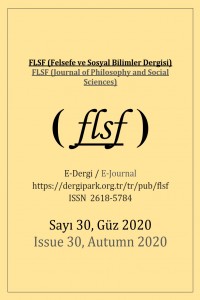Abstract
This study focuses on two substantial works on the art of Ancient Greek tragedy, namely “Poetics” (335 BC), in which Aristotle conveyed material information about the art of tragedy, and “The Birth of Tragedy from the Spirit of Music” (1872), in which Nietzsche regarded certain elements of art as a touchstone for his philosophy. These two important works written on tragedy are considered as prominent sourcebooks that shed light on the roots of art, and therefore these two philosophers face off in a study on the art of tragedy.
This study aims to unfold the Nietzschean argument that tragedy is claimed to be dead. In line with this purpose, firstly, the art of tragedy was addressed from mythos with its ancient roots to the logos where philosophical discourses emerged, with the values attributed by Nietzsche and Aristotle, without being detached from its own historicity. Then, together with its causes and consequences, what Nietzsche meant with his argument on the death of tragedy was investigated, and the findings obtained were interpreted.
References
- Aristoteles (2017) Metafizik. Çeviren. Ahmet Arslan. Divan Kitap İstanbul.
- Aristoteles (2016) Poetika. Çeviren. Ari Çokona, Ömer Aygün. İş Bankası Kültür Yayınları. İstanbul.
- Aristoteles (2018) Politika. Çeviren. Özgüç Orhan. Pinhan Yayıncılık. İstanbul.
- Bray, Warwick and Trump, David (1982) Dictionary of Archaeology. Penguin Books. London
- Çinçin, Kemal (2018) Ahlak Hukuk Çatışmasının Antik Çağdan Örneği: Kriton Diyaloğu, Akademia Sosyal Bilimler Dergisi Özel Sayı 1, 2018, s.98
- Deleuze, Gilles (2005) Nietzsche, Çeviren. İlke Karadağ, Otonom Yayıncılık. İstanbul.
- Euripides, (2019) Bakkhalar. Çev. Sebahattin Eyüboğlu. Türkiye İş Bankası Yayınları. İstanbul.
- Euripides, (2015) Hippolütos. Çev. Yılmaz Onay. TEM Yayıncılık. İstanbul.
- Georgopoulos, N. (Ed.), (1993) Tragedy and Philosophy. The Macmillan Press Ltd. New York.
- Habib, M.A.R. (2011) Literary Criticism From Plato to the Present. Willey-Blackwell, John Willey & Sons Publication.
- Kaufmann, Walter (1992) Tragedy and Philosophy, Princeton University Press, New Jersey.
- Latacz, Joachim (2006) Antik Yunan Tragedyaları. Mitos-Boyut Yayınları. İstanbul.
- Nietzsche, Friedrich (2018) Platon Öncesi Filozoflar, çev. Nur Nirven, Pinhan Yayıncılık. İstanbul.
- Nietzsche, Friedrich (2018) Tragedyanın Doğuşu, çev. Mustafa Tüzel, Türkiye İş Bankası Yayınları. İstanbul.
- Thomson, George (1968) Aeschylus and Athens, The Universal Library. New York.
- Zimmermann, Bernhard (2017) Antik Yunan Komedyaları. Mitos-Boyut Yayınları. İstanbul.
Abstract
Bu çalışma, Antik Yunan tragedya sanatı üzerine yazılmış iki önemli esere odaklanmıştır. Bunlardan bir tanesi, Aristoteles’in tragedya sanatı hakkında önemli bilgiler aktardığı “Poetika” (M.Ö. 335), diğeri ise Nietzsche’nin sanatın bir takım unsurlarını felsefesine mihenk taşı olarak gördüğü “Müziğin Ruhundan Tragedyanın Doğuşu” (1872) adlı eserleridir. Tragedya üzerine yazılmış bu iki önemli eser, sanatın köklerine ışık tutan önemli kaynak kitaplar olarak değerlendirilmekte ve bundan dolayı da tragedya üzerine yapılacak olan bir incelemede bu iki filozof karşı karşıya gelmektedir.
Bu çalışmanın amacı, tragedyanın öldüğünün iddia edildiği Nietzscheci argümanın açılımını yapmaktır. Bu amaç doğrultusunda ilk olarak tragedya sanatı, Nietzsche ve Aristoteles’in yüklediği değerlerle birlikte, antik kökleri olan mitostan felsefi söylemlerin baş gösterdiği logosa kadar, kendi tarihselliğinden kopartılmadan ele alınmıştır. Ardından Nietzsche’nin tragedyanın ölümünü bildirdiği argümanla neyi kastettiği, neden ve sonuçlarıyla birlikte araştırılmış ve elde edilen bulgular yorumlanmıştır.
References
- Aristoteles (2017) Metafizik. Çeviren. Ahmet Arslan. Divan Kitap İstanbul.
- Aristoteles (2016) Poetika. Çeviren. Ari Çokona, Ömer Aygün. İş Bankası Kültür Yayınları. İstanbul.
- Aristoteles (2018) Politika. Çeviren. Özgüç Orhan. Pinhan Yayıncılık. İstanbul.
- Bray, Warwick and Trump, David (1982) Dictionary of Archaeology. Penguin Books. London
- Çinçin, Kemal (2018) Ahlak Hukuk Çatışmasının Antik Çağdan Örneği: Kriton Diyaloğu, Akademia Sosyal Bilimler Dergisi Özel Sayı 1, 2018, s.98
- Deleuze, Gilles (2005) Nietzsche, Çeviren. İlke Karadağ, Otonom Yayıncılık. İstanbul.
- Euripides, (2019) Bakkhalar. Çev. Sebahattin Eyüboğlu. Türkiye İş Bankası Yayınları. İstanbul.
- Euripides, (2015) Hippolütos. Çev. Yılmaz Onay. TEM Yayıncılık. İstanbul.
- Georgopoulos, N. (Ed.), (1993) Tragedy and Philosophy. The Macmillan Press Ltd. New York.
- Habib, M.A.R. (2011) Literary Criticism From Plato to the Present. Willey-Blackwell, John Willey & Sons Publication.
- Kaufmann, Walter (1992) Tragedy and Philosophy, Princeton University Press, New Jersey.
- Latacz, Joachim (2006) Antik Yunan Tragedyaları. Mitos-Boyut Yayınları. İstanbul.
- Nietzsche, Friedrich (2018) Platon Öncesi Filozoflar, çev. Nur Nirven, Pinhan Yayıncılık. İstanbul.
- Nietzsche, Friedrich (2018) Tragedyanın Doğuşu, çev. Mustafa Tüzel, Türkiye İş Bankası Yayınları. İstanbul.
- Thomson, George (1968) Aeschylus and Athens, The Universal Library. New York.
- Zimmermann, Bernhard (2017) Antik Yunan Komedyaları. Mitos-Boyut Yayınları. İstanbul.
Details
| Primary Language | Turkish |
|---|---|
| Subjects | Philosophy |
| Journal Section | Articles |
| Authors | |
| Publication Date | December 10, 2020 |
| Submission Date | September 9, 2020 |
| Acceptance Date | November 1, 2020 |
| Published in Issue | Year 2020 Issue: 30 |
Starting from 2024, our journal will be published in 3 issues as two regular and one special issues. These issues will be published In May (regular issue), September (special issue) and December (regular issue).
Acceptance of articles for our special issue and our regular issue in December will begin on March 15.
Only articles within the scope of the file will be included in our special issue.
Thank you for your attention.


